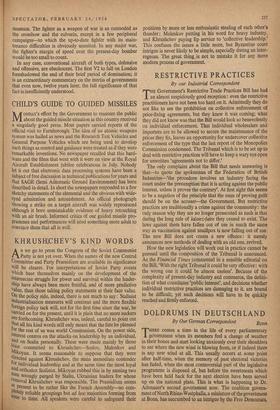RESTRICTIVE PRACTICES
By our Industrial Correspondent TanGovernment's Restrictive Trade Practices Bill has had 1 an almost suspiciously good reception : even the restrictive practitioners have not been too hard on it. Admittedly they do not like to see the prohibition on collective enforcement of price-fixing agreements, but they knew it was coming; what they did not know was that the Bill would look so benevolently on individual enforcement. That individual wholesalers and importers are to be allowed to secure the maintenance of the prices they fix, leaves an opportunity for undercover collective enforcement of the type that the last report of the Monopolies Commission condemned. The Tribunal which is to be set up to deal with restrictive practices will have to keep a wary eye open. for unwritten `agreements not to differ.'
The only complaint about the Bill that needs answering is
that—to quote the spokesman of the Federation of British Industries—`the procedure involves an industry facing the court under the presumption that it is acting against the public interest, unless it proves the contrary'. At first sight this seems to be a negation of the principle that the onus of proving guilt should be on the accuser—the Government. But restrictive practices are traditionally a crime against the community : the only reason why they are no longer prosecuted as such is that during the long rule of laissez-faire they ceased to exist. The laws against them have fallen out of use in much the same way as vaccination against smallpox is now falling out of use. The new Bill does not create a new offence : it merely announces new methods of dealing with an old one, revived. How the new legislation will work out in practice cannot be guessed until the composition of the Tribunal is announced. As the Financial Times commented in a sensible editorial on the Bill, `With the right Tribunal it could be very effective : with the wrong one it could be almost useless'. Bedause of the complexity of present-day industry and commerce, the defini- tion of what constitutes 'public interest', and decisions whether individual restrictive practices are damaging to it, are bound to be difficult; yet such decisions will have to be quickly reached and firmly enforced.


































 Previous page
Previous page